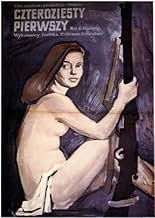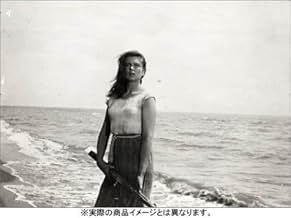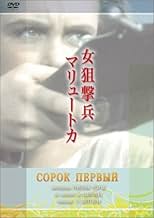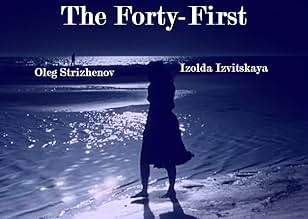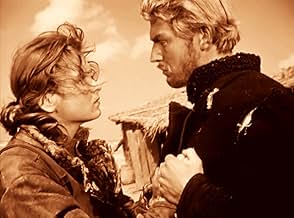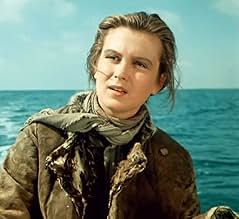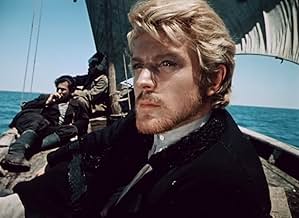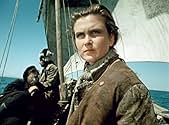IMDb RATING
7.5/10
1.8K
YOUR RATING
An unexpected romance occurs for a female Red Army sniper and a White Army officer.An unexpected romance occurs for a female Red Army sniper and a White Army officer.An unexpected romance occurs for a female Red Army sniper and a White Army officer.
- Director
- Writers
- Stars
- Awards
- 1 win & 1 nomination total
Nikolai Dupak
- Soldier Andrei Chupilko
- (as N. Dupak)
Georgi Shapovalov
- Soldier Terentyev
- (as G. Shapovalov)
Lev Kovylin
- Soldier Kovylin
- (as L. Kovylin)
Yuriy Romanov
- Soldier Vyakhir
- (as Yu. Romanov)
Daniil Netrebin
- Soldier Semyannin
- (as D. Netrebin)
Asanbek Umuraliyev
- Soldier Umankul
- (as A. Umuraliev)
Anatoli Kokorin
- Soldier Yegorov
- (as A. Kokorin)
Vadim Sinitsyn
- Wounded soldier
- (as V. Sinitsyn)
Kirey Zharkimbayev
- Timerkul
- (as K. Zharkimbayev)
- Director
- Writers
- All cast & crew
- Production, box office & more at IMDbPro
Featured reviews
What a beautiful film. And the music score is unforgettable. I watch the film maybe 25 years ago; rewatched it today. Not only I remembered the plot, I also remembered the music. There are not many films of which I can say the same.
An outstanding piece of work, great color and lighting, straight forward story without the usual Hollywood junket attached proving again the skill of Soviet cinema making; very good ending.
Grigori Chukhrai's film, The Forty First, sets itself up to be understood as a mythic series of events; the opening scene's churning waves seem to take the viewer away to a different world and the narration sets the story in the post-Revolutionary Civil War. This narration gives the effect of a story being told, and the way the landscape is portrayed creates an unreal landscape. The colors always seem too saturated and the sky hangs close and heavy over the actors, giving the appearance of a fish bowl. Maryutka's inclusion in the plot attests to the Bolshevik ideal of gender equality, making a break with Stalinism's reinstatement of traditional gender roles; her being referred to as an "Amazon" enhances the mythic quality of the film. Chukhrai consciously constructs shots that juxtapose; the scene of Maryutka and the White Army lieutenant walking separate on the beach contrasts the two in space as they both walk in different points of the frame in different directions. The final scenes are obviously ideological: the dialogue is crafted as a metaphor for Tsarist Russia and Communist Russia, with the lieutenant (Tsarism) pleading Maryutka (Communism) to return to how they were before the fighting; the officer's dangling cross necklace is an ever-present symbol of Imperial Russia, designating that even when all visual indicators of partisanship are gone (as he and Maryutka's uniforms have been destroyed by the elements), there is still an irreconcilable difference present. The last scene illustrates the valuation of duty over emotions. Besides the smartly handled ideology, the visual effects are The Forty First's strengths. The color palette and the contrasts it creates are striking, and create a hazy, dreamlike world in which a legend is played out.
wise use of close-up.wonderful images. pure poetry. a special vision about war and love. all of that makes it more than propaganda tool but an impressive expression of profound art. it is a film about values and beauty, choices and ideals. realistic, cruel, full of subtle symbols - the desert, the isle -, mark of a great director and science of nuances from two impressive actors. the story is only basic point for respect the ideological commands. but the skin of this nucleus has the rare virtue to make it more than piece of a period. the final dialog between lovers , the end, the boat in storm and near the isle, each is a precious ingredient for an universal message about duty and choices, far to basic triumphal message of regime.
like many films from the same period, the poetry of image saves it from the ideological web. because the basic aesthetic virtues are only parts of a splendid love story in the time of war. because the story is just support for seductive images. a film about borders and feelings. honest, fresh, melancholic, bitter. but useful for discover the spirit of a slice of history and the art of a great director. for discover the nuances who are only fruits of each detail. and to meet two interesting actors. a film about war, hate, love and strange form of peace. and, sure, about the duty. as piece who defines the characters. the last scene remains a long time in memory. not only for the drama but for the profound poetry who transforms the political command in seed of a story after the film's story. a film about the most precious emotion. made in one of the most inspired manners.
Did you know
- ConnectionsFeatured in Fejezetek a film történetéböl: A szovjet film 1953-1970 (1990)
- How long is The Forty-First?Powered by Alexa
Details
- Release date
- Country of origin
- Language
- Also known as
- The Forty-First
- Filming locations
- Mosfilm Studios, Moscow, Russia(Studio)
- Production company
- See more company credits at IMDbPro
Contribute to this page
Suggest an edit or add missing content


